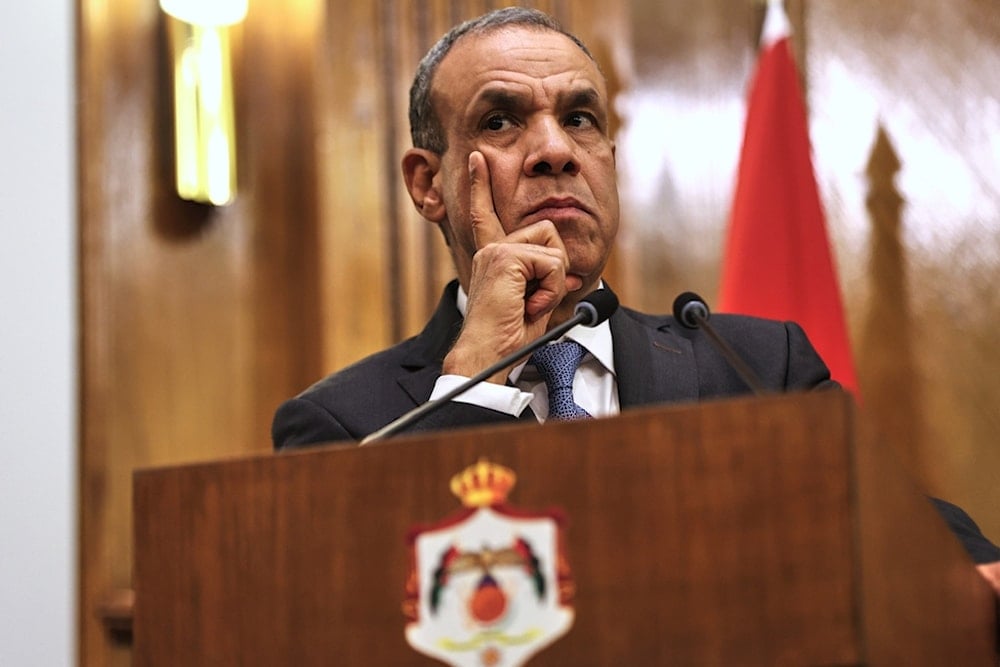Egypt seeks 60-day Gaza truce, warns 'Israel' over renewed war
Egypt’s FM Badr Abdel Aty confirms efforts for a Gaza ceasefire and warns the Israeli occupation that renewed aggression will destabilize the region.
-

Egyptian Foreign Minister Badr Abdelatty listens to speakers during a press conference following the ministerial committee of the Arab-Islamic Extraordinary Joint Summit on Gaza, in Amman, Jordan, Sunday, June 1, 2025. (AP)
Egyptian Foreign Minister Badr Abdelatty announced Sunday evening that Cairo is working toward a 60-day ceasefire agreement in Gaza, expressing hope it would serve as a stepping stone to a more durable political process.
“We are working on a forthcoming agreement in Gaza that includes a 60-day truce, with the hope of transitioning to the next phase,” Abdelatty said in a televised interview. He emphasized that any resumption of the Israeli aggression after an agreement is reached would be a major source of regional instability, referencing the January 19 ceasefire that was later broken by the Israeli regime without justification.
Abdelatty added that the United States understands the importance of including safeguards in any Gaza agreement to ensure the sustainability of a ceasefire. The Egyptian official's remarks follow recent diplomatic pressure on Cairo to stabilize the situation amid repeated Israeli attacks and failed ceasefire attempts.
Peace treaty still honored, but tensions rising
When asked about Egypt’s longstanding normalization agreement with the Israeli occupation since 1979, the foreign minister replied, “We are committed to the peace treaty and all its obligations. All indications confirm mutual interest in maintaining the agreement.”
However, Abdelatty noted that ongoing massacres and settler violence in both Gaza and the occupied West Bank are casting a shadow over bilateral relations. “The extreme brutality and crimes being committed against the Palestinian people, especially in the West Bank, negatively affect the course of Egyptian-Israeli relations,” he said.
Responding to questions about the growing perception among Egyptians that the Israeli occupation is acting with unchecked force in the region, especially with backing from the United States, Abdelatty firmly stated, “Egypt is a large, strong country, capable of defending its national security against any threat from any direction. The Egyptian Armed Forces are fully capable of protecting the nation’s borders and interests.”
'Brute force will not secure Israel'
Abdelatty also reiterated Cairo’s warnings to the Israeli occupation regarding the use of military dominance: “We have repeatedly reminded Israel that arrogance and brute military force will not bring it lasting security.”
In response to Israeli Prime Minister Benjamin Netanyahu’s ambitions to redraw the map of the Middle East, the Egyptian minister dismissed such ideas as “delusional.” He added, “Any talk about regional security must be based on the collective will of the region’s states, not dictated by a single power. The evidence is clear: force and domination have not secured Israel.”
'Israel is no longer an asset'
The Telegraph wrote on Thursday that "Israel's" latest military strike on Iran has provoked widespread concern among Gulf Arab states, who increasingly view Tel Aviv's actions as a grave threat to regional stability. Long marketed as a bulwark against Iran, "Israel" is now being recast by many in the region as the Middle East's most destabilizing actor, particularly as its war machine turns its sights on sovereign nations beyond Palestine.
One Arab diplomat, reflecting a growing sense of alarm, described the Israeli attack on Iran as "unforgivably reckless." While some Gulf officials admitted to hoping "Israel" succeeded in hitting Iranian nuclear sites, there is now deep unease over Prime Minister Benjamin Netanyahu's unrestrained militarism.
"He appears to be beyond restraint, in Gaza, Lebanon, Syria, and now Iran," said one official. "Unchecked, uncontrollable power is no longer an asset for us. It is a problem."
Accords unraveling
This shifting tone represents a notable fracture in the normalization accords pushed by the Trump administration that sought to formalize Arab-Israeli ties in the name of countering Iran. Those agreements, signed by the UAE, Bahrain, Morocco, and Sudan, are now facing a crisis of legitimacy as "Israel's" true role, as a belligerent occupier and regional aggressor, is laid bare.
The original appeal of the accords rested in the illusion of a unified front against Iran, portrayed for years in Western and Gulf capitals as a looming menace. But in reality, Iran has consistently called for dialogue, sovereignty, and justice for Palestine, positions increasingly echoed by populations across the Arab world, even if not yet reflected in official Gulf policy.
Read more: Iran urges Islamic unity as OIC plans emergency meet on 'Israel'
As cited by The Telegraph, Mohammed Baharoon, director-general of B'huth, an Emirati policy research institute, pointed to the fear that "Israel's" aggression could expand beyond Palestine, Syria, or Iran. "Israel has the 'ability to strike any country,'" he said. "What would stop them attacking Qatar, or Qatari interests – for example, in the gas fields it shares with Iran?" He noted that Qatar's hosting of Hamas' political bureau has long angered Tel Aviv.

 5 Min Read
5 Min Read








